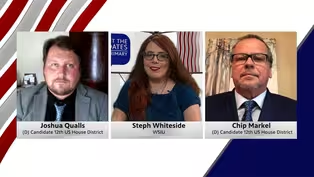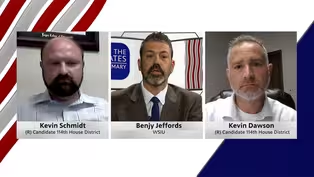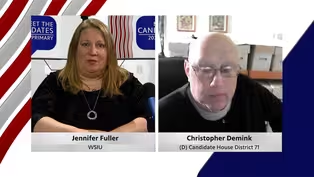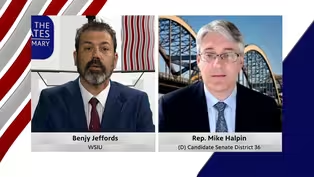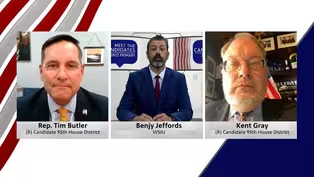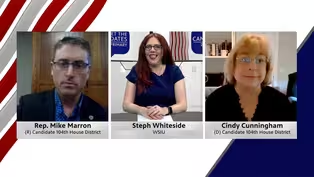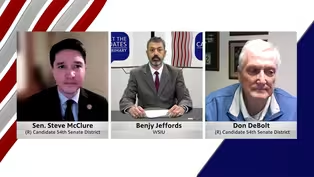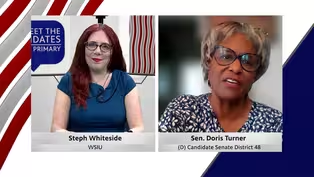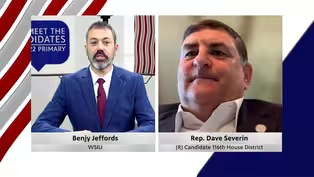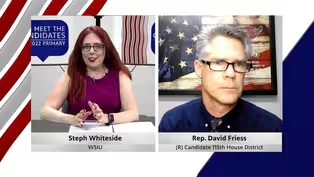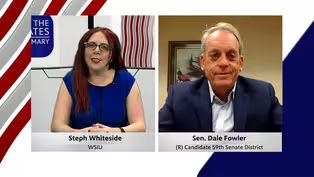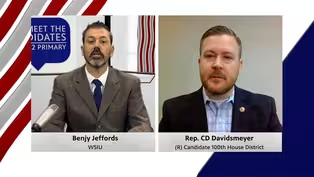Meet the Candidates
58th Illinois Senate District Primary Republican Candidate
4/21/2022 | 25mVideo has Closed Captions
WSIU interviews Senator Terri Bryant from the 58th Senate District.
On this episode of Meet the Candidates, WSIU interviews Senator Terri Bryant from the 58th Senate District.
Problems playing video? | Closed Captioning Feedback
Problems playing video? | Closed Captioning Feedback
Meet the Candidates is a local public television program presented by WSIU
This series is produced in partnership with the League of Women Voters
Meet the Candidates
58th Illinois Senate District Primary Republican Candidate
4/21/2022 | 25mVideo has Closed Captions
On this episode of Meet the Candidates, WSIU interviews Senator Terri Bryant from the 58th Senate District.
Problems playing video? | Closed Captioning Feedback
How to Watch Meet the Candidates
Meet the Candidates is available to stream on pbs.org and the free PBS App, available on iPhone, Apple TV, Android TV, Android smartphones, Amazon Fire TV, Amazon Fire Tablet, Roku, Samsung Smart TV, and Vizio.
Providing Support for PBS.org
Learn Moreabout PBS online sponsorshipMore from This Collection
Meet the Candidates features interviews with candidates running for Illinois state, House and Senate races. Guests will discuss key issues impacting Illinois voters such as the economy, the environment, education and public health. This series is produced in partnership with the League of Women Voters.
12th U.S. Congressional Seat Primary Candidate Forum
Video has Closed Captions
Joshua Qualls and Chip Markel, running for the 12th U.S. Congressional Seat. (25m 21s)
114th Illinois House District Primary Candidate Forum
Video has Closed Captions
Dr. Kevin Schmidt and Kevin Dawson, running for the 114th House District. (25m 57s)
71st House District Primary Candidate
Video has Closed Captions
Ahead of the June primary, WSIU talked with Christopher Demink, running for the 71st House (21m 35s)
36th Senate District Primary Candidate Forum
Video has Closed Captions
WSIU talked with 36th Senate District candidate Representative Mike Halpin. (26m 29s)
95th Illinois House District Primary Republican Candidates
Video has Closed Captions
Representative Tim Butler and Kent Gray, running for the 95th House District. (26m 58s)
104th Illinois House District Primary Candidates
Video has Closed Captions
104th House District candidates Representative (R) Mike Marron and (D) Cindy Cunningham. (26m 49s)
54th Illinois Senate District Primary Republican Candidates
Video has Closed Captions
54th Illinois Senate District Primary Republican Candidates forum. (25m)
48th Illinois Senate District Primary Democrat Candidates
Video has Closed Captions
48th Illinois Senate District Primary Democrat Candidates forum. (26m 46s)
116th Illinois House District Primary Republican Candidates
Video has Closed Captions
116th Illinois House District Primary Republican Candidates forum. (25m 9s)
115th Illinois House District Primary Republican Candidates
Video has Closed Captions
115th Illinois House District Primary Republican Candidates forum. (23m 14s)
59th Illinois Senate District Primary Republican Candidate
Video has Closed Captions
WSIU interviews Senator Dale Fowler from the 59th Senate District. (27m 29s)
100th Illinois House District Primary Republican Candidates
Video has Closed Captions
WSIU interviews candidate C.D. Davidsmeyer, running for the 100th House seat. (26m 9s)
Providing Support for PBS.org
Learn Moreabout PBS online sponsorship(upbeat music) (dramatic music) - This is "Meet the Candidates".
And we are here with Senator Terri Bryant from the 58th Senate district.
I'm Benjy Jeffords.
WSIU Public Broadcasting and the League of Women's Voters are pleased to host today's forum.
Thank you so much for joining us today.
Terri, let's get started.
What is your number one priority if elected?
I know it can be hard to narrow it down, but please try to stick to just one.
- Well I would say right now, the number one priority is getting three things taken care of.
I know you're asking for one, but basically it's crime, corruption, and cost of living in Illinois right now.
- Excellent.
And what would make you an effective lawmaker?
- Well I hope that I've been an effective lawmaker for what is now eight years.
And I think what makes me most effective is that rather than getting myself caught up often in partisanship, I try to listen to each of the constituents in the district, a way out whether or not I can help them.
And then if I can help them we do that for sure.
And if it's a little bit more difficult, we try to work through what those difficulties are, but I also make it a priority that if we're unable to assist someone, then we try to work out who can help them with their issue.
- Excellent.
And the pandemic really exposed disparities in education funding.
What would you do to make sure schools in your district are able to meet the needs of the families and students?
- I think we did a little bit of that in this last session.
In fact, we increased funding for not only higher education, but K-12, sorry, P-12, in fact, there's 550 million more going to P-12 education.
It takes a combination of listening to teachers, listening to the administrators and listening to the school board members.
And in fact, I think I've been very effective in doing that as has been evidenced by the fact that I am endorsed.
For this season we haven't gone through endorsements yet, but in the past seasons I've been endorsed by all three of those entities.
And I think that's uncommon for legislators.
And so I think it's indicative of the fact that I try to listen at all levels of education to make sure that we're hearing the parents as well as the educators, the administrators, and the school board members.
- Excellent.
And the state budget is a major priority in Springfield.
Name three things you would prioritize.
- Well I think I did that in your first question, crime, corruption, and cost of living.
Crime certainly is forefront in everyone's mind right now after the law went into effect that is now called the Safety Act.
We know that it has in fact not helped to bring down crime.
It has in fact, I think exacerbated the problem.
And then of course the corruption issue causes dollar after dollar after dollar to be spent, because we have all levels of corruption in Illinois, going from Governors who have been indicted, convicted and locked up through Mike Madigan and many of the individuals that are tied to him down to multiple legislators now, both in the Senate and the house, and even mayors and city council members that are still being worked through the system right now.
And then of course, cost of living.
What does it cost to go get a gallon of milk?
What does it cost to get gasoline right now?
What's it gonna cost to put our kids through school in the fall?
Those are all three super important issues.
- And now that we've talked about the budget priorities, what are three things you would cut?
- Oh gosh, cutting's always a little bit more difficult because we wanna make sure that everyone's needs are taken care of.
And the pad answer is always getting rid of waste and fraud.
We've worked on that a lot over the last few years I think.
Certainly right now we need to look at cutting, I would say in higher education, we need to look at cutting programs that do not help someone to move their career forward.
So at SIU, since that's who's hosting us right now, I would say they they've done an effective job so far of cutting in the areas of programs that really don't help an individual as they go out into the career field.
We're taking a look at that now in the area of preschool through 12th grade, looking at how we can use the money more effectively.
So more than cutting, I think we have to look at how do we use the dollars more effectively.
We're looking at how we can advance vocational education.
How do we take some of the programming, say in the high school arena and make that more effective towards helping young people as they leave high school to take what they've learned in high school and use that immediately in the higher education field.
So I think your question being where do we make the cuts?
I think the question really should be how do we use our dollars more effectively?
- Excellent.
And although the economy is recovering from the early stages of the pandemic, inflation is also on the rise.
What would you do to help Illinoisans who are finding their paychecks don't stretch as far as they did even a couple months ago?
- Well the Republicans had a pretty good plan for how we would cut the cost of gasoline.
That's one area that's hitting people really hard in the pocketbook.
The Republican plan was to cut the sales tax that goes on top of the motor fuel tax and the cost of gasoline.
That plan was not moved forward by the Democrat majority or by Governor Pritzker.
So what we're gonna be looking at, which did pass, and I did vote for, was putting a hold on the motor fuel tax in July.
So rather than motor fuel tax increasing by roughly 2 cents on the gallon, that that will be halted for six months.
I hope we go farther than that six month period.
The problem then lies in how do we fund our roads and bridges?
And right now that hole is gonna be filled by taking money from a fund called the LUST fund.
We don't wanna keep doing that because that's a fund that's important as well.
But we also took a stab at cutting the cost for folks when they go to the grocery store.
So for the next year we'll have no taxes on groceries or on medical supplies when you go to the grocery store.
So I think that's gonna be an effective help.
So we need to keep looking at some of those things that can help the consumer when they go to pay the bills that add up.
And so our challenge right now is gonna be the budget that was just passed is for $46.5 billion, there's only about a $2 million cushion in that budget.
So immediately have to make changes if the economy does go south.
And if we do have an increased inflation, which I believe we're gonna see, and we're gonna see it relatively soon.
- Excellent.
And many people are pushing for more renewable energy, especially with the rising price of oil.
At the same time, parts of Illinois have fossil fuels supplies that could provide energy for many years to come.
What would you do to ensure Illinois has a steady supply of energy and keep it affordable for Illinoisans?
- Well I think we need to continue down part of the path that we've been going, and that is making sure that we encourage the use of solar as well as wind.
Wind is probably not gonna be an option for we here in Southern Illinois.
It's gonna be more of what we do with solar, but at the same time, we have to make sure that we don't cut off our noses despite our face.
For instance, the bill that passed this past year, the energy bill mandates that Prairie State Energy close between 2035 and 2045, depending on whether or not we're able to capture carbon.
What that in essence is I think for Southern Illinois is gonna do is actually damage our attempts to move the energy conversation forward, and that's because it's gonna hurt the grid very much.
So what we're gonna end up having to do to make sure that we supply energy for Southern Illinois is purchase energy from outside the state, probably from Missouri, Indiana and Kentucky, all of which are coal-burning states.
We all share this same air from those three states.
So I think we have to be a little bit smarter about what we're doing.
Certainly right now we do need to subsidize things like solar, but we also need to remember that even though we have sulfur coal in Southern Illinois, the BTUs on our coal three times hotter than that of Western coal.
So I think that needs to be a part of our conversation going forward is we have hundreds of years of coal energy right here in our own region.
How do we do that in a way that allows us to also move the conversation forward for solar and other renewable energies?
- COVID 19 really changed the way people look at healthcare and public health.
What would you do to make sure Illinois is prepared to handle future public health emergencies?
- I think that it would be helpful if we had a little better information on where the stockpile of items are like things like face masks, how do we access those as individuals at the beginning, and I'm just using that one as an example, there are other more important things, but I'm just using this one as a small example.
For instance, we had a very hard time accessing simple things like K95 and N95 masks.
And in fact, just regular surgical masks, if it wasn't for our friends who are at SIU who have connections with the Taiwanese government, we would've had a really hard time in Illinois even accessing simple things like face masks.
I do think that it would be, now that we have better in place the ability to make ventilators.
We now know how to make them instead of working from scratch, companies were able to convert quicker.
I think as we get through this now, putting some of that more in a, I don't know, I'll simplify and say like a how to manual so that you're able to access the companies that are able to do that and the resources are more readily available.
And certainly I think that we need to address the fact that a Governor's ability to go to executive orders rather than the legislature meeting, it has been an ongoing problem.
And so we as legislators need to enact legislation that says that the Governor can do an emergency order that one time, but then we as legislators need to make sure that we are in the capitol building and we are acting on, now we've enacted Zoom.
Now we've all gotten pretty good at that.
So we know now that we are able to meet quicker and pass the legislation that we need to get done as opposed to either allowing a Governor to do that or placing it on the back of the Governor that's doing it.
So I'm not even gonna blame the Governor totally for this.
He acted on those executive orders.
That was what was at his a disposal to do so.
The legislature I believe should have acted more quickly and we need to make sure that the leaders in the legislature are making that happen.
That's one thing we need to do better.
- And gun violence continues to be a problem for communities across the state.
What would you do to address the violence and how do you balance that with second amendment rights?
- Well, first of all, the approach that has been taken, which is to remove firearms from otherwise law-abiding citizens does not help the issue.
The issue is those who already have access to illegal firearms.
Quite often, we're finding that those are coming in straw sales from Indiana.
And we don't act appropriately as a state to punish those who are in fact perpetrating that crime, whether it's the individual that's dealing those firearms as straw purchases, or whether it's the individual that is purchasing those firearms.
What's happened is we have made victims out of criminals and we're making criminals out of otherwise law-abiding citizens.
And so the balance has to be making sure that we lock up the bad guys and that the laws that we put into place are to get rid of the bad actors.
And not that we are violating someone's second amendment rights, a right that we've seen in other countries that are taken away, that actually leads to revolution.
So one of my best friends is from Nicaragua, she mentioned that the first thing that happened in Nicaragua was people's rights to assemble were taken away.
And soon after that, their rights for private ownership of firearms, and then tyrannical governments can come into play and take away all of our other rights.
So right now we need to make sure firearms are taken away from the bad guys.
And we make sure that the rights of law abiding citizens are protected.
- Criminal justice reform is a hot topic in Springfield.
Do you support changes to the system, including alternative sentencing, options like drug court, and what changes would you make to ensure safety while also making sure rehabilitation remains an option?
- So those who know me well know that I'm retired from the department of corrections.
So 20 years of working in the criminal justice system gives me a perspective that's a little bit different than some other legislators.
I started my career in the department of corrections, right there in Carbondale at what used to be called the Glass House.
So I believe that there are programs that are already in place that do not get adequate funding.
Under Governor Quinn, Governor Quinn closed five work release centers.
Those work release centers are the place where someone who is a nonviolent offender, no class X, no class 1, individuals who are able to go and learn a work skill and then go to work in our communities.
We know that those individuals are gonna be out in a very short amount of time and they need simple skills.
Some of them can't read, some don't know how to fill out a job application.
It's why I work so hard to get Murphysboro Redirection Facility opened.
It used to be a juvenile facility, the vision that I had that actually under Governor Rauner, and now under Governor Pritzker, they have continued to work under, was making sure that we have vocational skills.
And so I would say one of the things that we need to do is make sure that in the setting of department of corrections or for those who are already incarcerated, either at the county level or the state level, we need to make sure that there's programming that gets them back out as productive citizens.
But for those who are not incarcerated yet, for those who are headed down a wrong path, then yeah, I do believe in drug court.
I believe in veterans court, I believe in alternative sentencing.
What I don't believe in is no cash bail.
Whenever you put someone back out on the street again, and they have no incentive to come back to court, I think that's taking us down a very bad path.
And so there are some aspects of the Safety Act or aspects of the criminal justice reform I can get on board with.
There are a lot of what we see in the Safety Act that is taking us down a very bad path.
And again, I hate to keep saying this, but we're putting bad guys back out in the street again, and we're making criminals out of victims.
And we saw that, again, I wish we had more time to talk about something like the prison review board and what a catastrophic failure the prison review board was.
So I worked on the executive appointments committee as one of the three Republicans on there to take off three of the worst members of the prison review board and replace them with individuals who are better qualified and who don't put murderers of children and police officers back out on the street again.
- And recent events have shown how much Americans can be impacted by global politics as evidenced by supply chain shortages and rising prices due to the pandemic and fighting in Ukraine.
What would you do to try to help minimize the disruption of events like these on the people of Illinois?
- One very simple thing that we've talked about over the last couple of weeks in Springfield is changing the law so that CDL licenses right now, you have to be 21.
I believe that we should lower that age.
Some people think 18 is too young, that they're not quite mature enough, that still leaves us a lot of room for 19 and 20 year olds.
So that would give us more truck drivers on the streets.
That's one thing.
And of course, as goes supply chain, it's very difficult especially in Illinois when our taxing policies have made industry an enemy of the state.
And so if we want more producers, especially here in Illinois, then our tax policies have to say that.
We have to be friendlier to business, allow them to manufacture more, allow them to move it easier.
I would say the other thing in supply chain, making sure that our rails are safe.
And then one thing that we've done, and that is to make sure that our roads and bridges are now funded.
So if you want folks to travel through Illinois and to move our goods and services in a safe way, we have to make sure that we have safe roads.
- What would you do to make sure concerns of your constituents are heard in Springfield considering the population density skewers toward the Northern part of the state?
- Well I'd like to believe that I've been a big part of making sure that our voice is heard.
Certainly I'm a go-to person when it comes to Springfield in answering in questions about our region, we've worked really hard to make sure that we have a block of votes.
We began that when representative Costello was still in place, Jerry Costello was the chairman of the downstate Democrats.
I served in the house as the chairman of the downstate Republicans, between he and I, if we got on the same page for something we could help to influence about 70 votes in the house.
And then often that bled over into the Senate.
I think that we have to make sure that we're talking across party lines, but we've put a good block of legislators together in Southern Illinois, between myself, Senator Fowler, representatives Windhorst, Jacobs, Severon, and Friese.
That's a very good block.
And then when we add in Charlie Meyer and Darren Bailey and Jason Plummer and their reps in the Metro east from river to river, we have a large voting block now in Southern Illinois that's loud and proud, and we make sure that our voices are heard in Chicago.
And then we're doing some simple things like working with the farm bureau to do adopted legislators.
So the adopted legislator, for instance, for Jefferson county, Illinois, is Robert Peters and Robert Peters and I are about as far on the opposite end of the spectrum politically and personally that two individuals can be.
But when Robert Peters came to Jefferson County to tour the farms and to tour our region, I met him in the Mount Vernon area and toured with him.
And so we were able to talk all day about our issues.
Those are small things that can be done.
So talking is the beginning of understanding each other.
That means I have to spend a little bit of time in Chicago, and those folks have to spend a little bit of time down here so that we learn each other's language.
There is kind of a joke about having had to hire back in the day a translator for Gary Forby.
And that was not because Gary Forby was hard to understand.
Although my friend Gary Forby, who was on the other side of the aisle, he is a little hard to understand sometimes, but culturally, sometimes it's a little hard to understand each other's needs.
And so we have to really be talking across party lines, from river to river, and from Chicago to Cairo.
- Excellent.
This is probably gonna be our last question.
What will you do to help ensure fair elections and access to voting for all people in Illinois?
- We've been talking a lot about this at different events.
I think first of all, people have to get civically engaged.
The first step to making sure that we have fair elections is to make sure that we have well trained judges at all of our polling sites.
So those are the paid folks that go and watch.
And they're the folks that are tasked legally with watching the elections.
And it's been a struggle over last few years to get election judges to be put into place and getting well-trained ones is that much harder.
So I would ask folks who are listening to this broadcast to contact the county clerk in whatever county you have to be listening from and tell them that you wanna be a trained election judge.
And then for those who don't get into those election judge positions, you can be a poll watcher.
You don't get paid for that, but you can sit there as a part of your party and watch everything that's going on, get trained to do those things.
So that's super important to make sure that we have good trained quality people watching those elections.
That's step number one and the most important aspect of ensuring that we have good, safe elections.
- Next question is internet access is becoming increasingly necessary for people to work and go to school.
What would you do to make sure rural areas can access the high speed internet they need?
- So we're gonna have some money coming from the federal government very shortly.
And that again requires we as legislators to make sure that we are not only making sure that the money that comes from the federal government is used appropriately in our region.
So that means your legislators, each of us individually have to be loud enough and forceful enough to make sure that those grants are awarded and doing that also make sure that we have to communicate with our US senators and our US congressmen and women.
And so right now, we're gonna make sure that the money that's gonna be coming from the federal government, the grants that are awarded and the legislative that we've passed in Illinois is distributed fairly and equitably, not only for underserved areas, but for unserved areas as well.
- Excellent.
Well thank you so much for joining us for "Meet the Candidates" for Senate district 58 with Senator Terri Bryant.
Tune in next Thursday at 7:00 PM for more.
For WSIU, I'm Benjy Jeffords.
(dramatic music)

- News and Public Affairs

Top journalists deliver compelling original analysis of the hour's headlines.

- News and Public Affairs

FRONTLINE is investigative journalism that questions, explains and changes our world.












Support for PBS provided by:
Meet the Candidates is a local public television program presented by WSIU
This series is produced in partnership with the League of Women Voters

